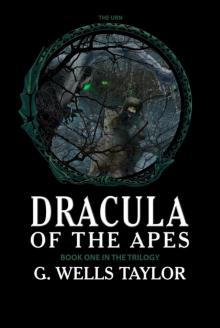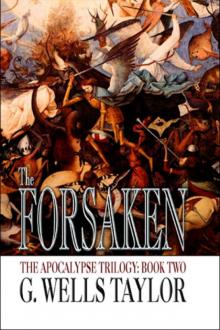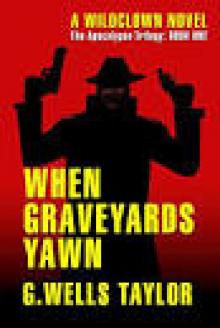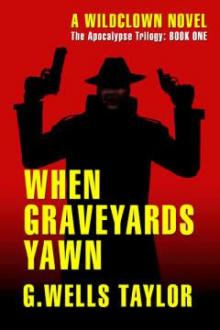- Home
- G. Wells Taylor
The Urn Page 18
The Urn Read online
Page 18
Before long a huge blackback male named Tobog, worked up by the admiration of his lesser blackback brothers, had led several charges toward the strange nest only to be met by thunder-hand’s ferocious howl. None were slain or injured, and Fur-nose seemed reluctant to use his power, so the blackbacks had made several more charges without receiving injuries.
Goro had watched this series of challenges somewhat bemused, for he knew that a challenge for his crown would one day come from Tobog; and he had already seen the vest of silver hairs starting to grow across the younger bull ape’s shoulders and hips.
The silverback had been made uneasy by Tobog’s successful charges against Fur-nose because it was also a show of strength meant to challenge Goro’s authority. The king wasn’t jealous of the praise given by the young blackbacks to the future challenger, but Goro had been wise enough to flex his own considerable muscle by casually ordering the troop away from the area while Tobog hurled rocks at the tree-nest and thunder-hand barked.
The silverback had been pleased to see Tobog bristle at the command before submitting as was demanded by tribal law. The younger male had to learn patience if he hoped to lead the group one day, for Goro would not be defeated by muscle alone.
But Tobog’s reason for testing Fur-nose’s defenses and power was unknown to Goro. He had been convinced by the other males to kill the strange creature, and take the thunder-hand so that he could use it to take the kingship away from Goro. All the apes expected Tobog to some day dethrone the silverback, so were easily convinced that the destruction of Fur-nose would speed up the succession.
These young blackbacks possessed more brawn than brains, and forever dreamt of being kings themselves, so they had been easily manipulated by a sly ape named Omag who told them challenging Fur-nose would result in either Tobog’s death or his succession and either outcome would shorten the distance to the throne for each of the blackbacks that remained.
In truth, Omag had also been jealous of Fur-nose’s power, and he very much wanted it for himself. He could tell—just as Goro the silverback knew—that the thunder-hand was a tool that the creature Fur-nose carried, like a rock used for opening nuts or a stick for spearing monkeys and bushbabies, though Fur-nose’s tool was far more powerful and threw painful injuries and death greater distances with its invisible but noisy touch.
Omag was a cripple by ape standards, but his mind was fleet and supple, far more able than any of the others.
Of course, all of the apes in Goro’s tribe were beyond the expectations of apes that are now left in the world, and so, such machinations could be expected, if unforgiven.
Cousin to the more familiar lowland gorilla and all but extinct from the world, these were like the apes known to the greater biological sciences, but also like humans in ways hypothesized by the philosopher Darwin who conjectured that humanity’s branch on the tree of life grew from a place on the trunk none too far from whence our many hairy cousins’ had sprouted.
It was a garden rich with fossils that had spawned Goro’s tribe of 62 apes, whose members were a molecule or two more like human than their lowly cousins, and possessors of a rudimentary language and understanding of the world because of it. A study of them would have made a fascinating contribution to evolutionary science had their line not died out.
But at the time of this narrative, they still ranged in small groups throughout the wildest parts of Africa, competing with the other lesser anthropoids and with man for space and resources in the jungle.
They were alike enough to the ape to look like him and have his habits, and so they foraged and traveled, feasting on plant-life, bugs and small animals. Their favorite foods were cabbage palm, gray plum and bananas—they had a passion for berries of any kind, and the wild pineapple that grew around the swamps to the south.
They went to considerable lengths to secure sources of the delicacies they craved. The apes loved nuts although cracking the shells between stones took considerable dexterity and patience—with bruised fingers being a common side effect—and figs were highly prized, though gathering them often left the apes battling troops of baboons or chimpanzees over rights to the delicious fruit.
The tribe favored meat also, and supplemented their diets by scavenging flesh from carcasses killed and abandoned by large carnivores. Sometimes the apes killed their prey themselves, forming cooperative groups to hunt smaller animals using their claws and fighting fangs, and using crude weapons of their own design. All members of the tribe might participate in these “hunting” expeditions, though it was a cultural preoccupation of the blackbacks who often bragged about their prowess.
The apes of Goro’s tribe hungered for flesh but would not eat any of their own. They hunted rodents, monkeys and young bushpigs, while occasionally savoring a larger prize like the speedy bushbuck, peaceful gorilla, or the wily chimpanzee.
The Tribe
Omag was an ambitious bull ape who might have been king of the tribe had he luck to match his addiction; but his political aspirations were dashed when he contracted a wasting disease from the rare flesh he craved. After its onset, the illness had left him demonstrably weaker than his peers with a disfigured face, mangy fur and the slow deformation of his limbs.
But despite the ravages of the disease, he remained an adult bull ape of great strength, and so it had come as no surprise when he made an attempt upon the kingship some years before by challenging his contemporary Goro when he had become their new, young leader
Goro had only recently taken the kingship from old Baho, and as the silverback then, Baho had fought well but wisely, capitulating quickly to his massive young challenger. It was after that victory that many in the tribe had started to believe that Goro was too young for his position because he broke with tradition and refused to slay Baho or exile him.
None had dared to challenge this outrageous decision except Omag, who after days of grumbling had ignored Baho’s warning and charged at Goro anyway—in a battle that he lost moments after it began.
Goro was a terrible force in a fight, but sentimental when it came to his tribe, and so after their brief but vicious struggle; the silverback had allowed Omag to live and stay with the group as he had old Baho; even though the deformed ape carried his shame and vengeful nature for all to see, grinding it between his teeth where his disease had caused the lips to rot and wither away exposing the fangs on the left side of his face.
The king’s pity had only served to twist the thorn in Omag’s pride, but the crippled ape stayed—some thought because he had future designs on the kingship, while others understood that Omag’s affliction made him incapable of surviving on his own.
Afterwards, Omag remembered his place for the most part and hated it, as he reminded the tribe whenever he flew into his rages or took his frustration out on the females and the younger members of either gender. Even the infants and nursing babes were not spared his fists.
His violent outbursts were short in duration, and always stifled by a rumbling growl of warning that rolled out of Goro’s mighty chest wherever he loomed protectively near. Still, the mothers were especially wary of Omag’s moods, and would keep their infants away from the brooding beast.
Yet a mother could not be ever watchful.
The tribe had hunkered down to feast on a patch of sweet berries and tangy grasses in an open space ringed with trees. They were headed back to the coast aware that fruit near Fur-nose’s lair was coming into season, and on their last visit, they’d left many of their favorites to ripen.
Omag squatted by the trees with his hands full of berries, and began carefully dropping them into his ruined mouth. Many of the delicious fruits rolled out of the hole in his cheek as he munched, causing him to bark angrily at each loss.
And each time he barked, the tribe’s anxiety rose, calmed only by degrees when Goro’s rumbling voice offered comfort. The silverback was lying among the foliage where the patch bordered the trees to the east while the females picked berries near the center of t
he clearing, their infants staggering wide-eyed among the stems. The plants grew high enough that only the chests and shoulders of the adults could be seen.
Three of the females had found eggs in a bird’s nest that hung beneath the thick leaves. They carefully cracked them against their foreheads before pressing the shells to their large lips and sucking the contents out.
One of these females, Eeda, was a beautiful young ape covered in sleek black fur. Her eyes were large and round and her features soft and pleasant. She had a long tuft of hair hanging from each temple that grew into a silky fringe following the curve of her jaw. All the apes in the tribe had this particular feature, though Eeda’s and the silverback Goro’s sideburns were exceptional by comparison.
Eeda’s little son Kado, her first and so her most precious, was moving about the plants, playing hide and seek with his friends. Or so it seemed. The little males were actually mimicking the scene that was unfolding around Goro even as the tribe grazed.
Two big blackbacks were stealthily closing on Goro, taking advantage of the high green underbrush to disguise their movements. They were adolescents so they were only going through the motions, training for a day when they might actually challenge the king.
But the training was not something to be taken lightly. Challenging a 450 pound silverback, even in mock preparation such as this, could be lethal. Goro was a giant of muscle and iron-like bone. Leaning forward on massive forearms he was a figure of immutable strength.
Goro had already sensed the approach of the upstarts and grunted his grim amusement. The fools were coming downwind, but the mock challenge made the king wonder again about the whereabouts of the giant Tobog for he had not seen or smelled him for many days. The prideful blackback was likely angry at the silverback’s insult at Fur-nose’s lair, and was probably seeking solace from his supporters.
The king could sense the other blackbacks in the trees plotting and planning, hunting or wrestling, and reveling in their strength as they guarded the group.
Then Goro remembered seeing Tobog leaving the tribe some few days after their last visit to the berries near Fur-nose. The big blackback had flung himself through the trees toward the west and he had not yet returned.
Tobog had stopped making mock challenges to Goro’s kingship some time ago, instead foraging in the jungle away from the troop with Omag, or sitting with the crippled ape under the pretense of grooming while they watched the silverback studying him for—weakness?
And the king thought again that perhaps he should have slain Omag long ago, or sent him into exile. But, Goro felt that his former challenger’s mind was damaged like his body, and that on his own his brain sickness would only fester. The king believed that Omag would heal if he were allowed to live with his tribe and since Goro knew no dishonor or weakness in his own heart; he was blind to its existence in others.
The young blackbacks charged out of the dense foliage with a shattering roar that was met with Goro’s own battle cry as he surged to his full height. He heaved the closest challenger into the air and with a thunderous bellow threw the blackback end over end into the tangled underbrush beneath the trees.
The second blackback lost his nerve when Goro’s fighting fangs turned toward him, so the ape retreated, speeding to the closest tree where he leapt into the lower branches.
Goro gave chase, as the other challenger gained his feet and followed, growling and screaming—embarrassed by the outcome of the first exchange.
The rest of the group watched this confrontation expectantly, listening carefully for the timbre of the voices and registering the undertone of merriment that thrummed in Goro’s cries. He was enjoying the mock battle. There would be no blood. The other blackbacks cried and hooted happily from their places in the forest and moved nearer the sparring to watch.
So the other apes breathed a collective sigh of relief and continued gorging on berries.
All except Eeda who was hooting worriedly, searching in the dense brush for her son.
Little Kado had crept closer to Omag to watch the disfigured ape from the cover of leaves near the beast’s feet.
As Omag tipped another handful of berries into his mouth, some of the tasty orbs he was already chewing started rolling out the hole in his cheek. Growling and frustrated, he attempted to wrangle them with his tongue, and in the action he made a wet, sucking noise...
...that Eeda’s little son mimicked.
“Sip. Sip,” he echoed, cheerfully, adding a high-pitched squeak of surprise and wonder as the great bull ape’s eyes flashed in recognition.
Omag swung his massive face down toward the insolent one-year-old, his deformities distorted into a hideous mask as he roared. His long canines hung through the dripping rent in his face and his eyes burned with fury, for Omag could only see the little one’s simple observation as mockery.
And such mockery was punishable with death.
Eeda shrieked as she recognized the source of the angry sound, and hurtled across the ten yards that divided her from Omag, her instincts sharpened by fear for the object of the big ape’s rage.
Omag stood half again as tall as Eeda, towering over the plants that grew around him and hid the focus of his wrath. He lifted his mighty arms, his clawed fingers curled to strike a murderous blow.
But Eeda flew into the space before him and crying out, she snatched Kado up against her breast just as Omag pounded downward with his fists; the blow glancing off the lithe young female’s muscular back.
Omag howled in rage as Eeda raced away, plowing through the thick undergrowth, her little son clutched to her chest.
The big ape gave chase, lurching after her, his head swinging side to side, jaws snapping with great strings of saliva hanging from his damaged mouth. Omag’s disease had not then progressed enough to twist his back and bones or force the unusual limping, and sidelong stagger that dogged his later life.
He was still a bull ape in his prime then, and filled with rage he was unstoppable.
Eeda knew this, and the knowledge spurred her flight. Her little one clung to her and made fearful squeaking sounds as she charged out of the underbrush and scrambled up the rough bark of a towering iroko tree.
Omag bellowed his fury and leapt into the branches after her, his longer arms and more powerful body quickly closing the gap between them.
Below them, the other apes had gone silent at the storm of emotion and action, and had quietly moved closer to each other to form tight groups, embracing and watching the high branches as the chase unfolded.
Goro and the blackbacks had settled their dispute some quarter mile distant and were celebrating their courage and prowess beneath a tree, eating fresh green shoots to cool their heated throats.
Many of the other young blackbacks had followed the action, and ambled out of the jungle to recount the mock battle and boast of the fights that were yet to come.
Goro tensed as they crowded around, and gave a powerful shout that caused them all to cower and offer their open hands in friendship. The king panted at his joke and soon the younger apes hooted their merriment in turn, some dropping to their backs as Goro pretended to savage their throats with his fearsome teeth.
Some of these were his sons, all were of his tribe.
The silverback was first to hear Eeda’s cries.
He climbed to his feet and stood erect; the action and his stance immediately copied by his underlings. Then Goro stood listening; interpreting the voice he’d heard. A female, but it was not the call made to describe any of the fanged cats or choking snakes that hunted apes.
Also, the riot of noise from the thick jungle continued unabated. If it were a carnivore, it would be silent. Instead, the jungle’s inhabitants squawked and screeched at trespassers.
A chase through the treetops, it seemed. There, Goro heard more birds cry out, swooping and dodging to protect their nests.
The danger had not come from outside of the tribe.
Some female was unhappy with her mate, or had
refused him and punishment was being meted out—perhaps...
He grunted powerfully, and started moving, leaning forward on his thick arms, strutting on all fours toward the tribe with a force of blackbacks at his heels.
A king’s work was never done.
But he would arrive too late, for Omag had chased Eeda far into the high canopy where the trees stretched for the sunlight. In her fear and desperation the female had chosen the tallest tree, and this lapse of judgment meant she soon found herself scrambling upward through the thinnest branches with the treetop shaking.
Omag bellowed, driving her upwards, his rage blinding him to all danger. The branches under him were already cracking from his great weight, but he pushed on, gripping the ever-thinning trunk with his powerful hands and feet as Eeda screamed above him
He shook the tree as he lunged and snapped at the female’s legs, as she made a desperate leap for a tree that grew near...
...and fell. For Omag’s contortions upon the swaying trunk had caused her to misgauge the distance of her jump.
Branches slashed at her as Eeda hurtled earthward, grabbing for them, seeking anxiously for any purchase; until she caught hold of one that held her weight. But the sudden jolt of her body’s deceleration caused Kado’s little fingers to slip through her glossy fur, and without a grip, he fell.
She made a desperate grab for him, but her fingers only brushed his coat.
Eeda watched, horrified, as her son plunged a hundred feet to the jungle floor.
Goro charged out of the forest roaring and pounding his mighty chest as Eeda crouched over her dead infant. The jungle behind the king shook and rumbled as his escort of noisy blackbacks arrived and spread out to take protective positions around the anxious tribe.

 Dracula of the Apes 2
Dracula of the Apes 2 Dracula of the Apes 3
Dracula of the Apes 3 The Urn
The Urn Painkiller
Painkiller The Forsaken - The Apocalypse Trilogy: Book Two
The Forsaken - The Apocalypse Trilogy: Book Two When Graveyards Yawn
When Graveyards Yawn The Variant Effect: PAINKILLER
The Variant Effect: PAINKILLER When Graveyards Yawn ta-1
When Graveyards Yawn ta-1 Painkiller tve-2
Painkiller tve-2 The Variant Effect
The Variant Effect